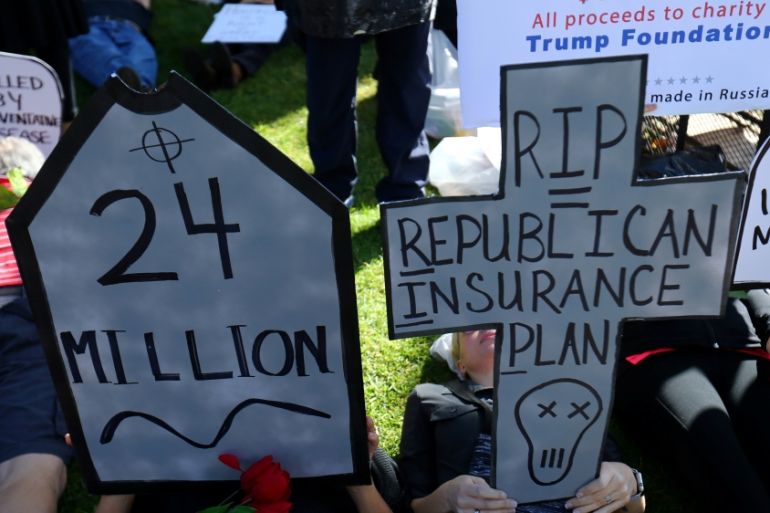The Obamacare debate is not just about healthcare
Lawmakers’ battle over healthcare laws in the United States is also a debate about the core values of America.

If you don’t live in the United States, the battle over the future of healthcare probably seems unimportant and even distant. You may watch with wonder and puzzlement but ultimately, you don’t care or understand it … except that you should.
Under the surface, it is not just a tussle over healthcare – it’s a struggle over what it actually means to be American. The result could have a profound and lasting impact on the country’s future.
Keep reading
list of 4 itemsWoman, seeking loan, wheels corpse into Brazilian bank
UK set to ban tobacco sales for a ‘smoke-free’ generation. Will it work?
Poland lawmakers take steps towards liberalising abortion laws
The question at the centre of the debate is very simple: is America a nation where government helps out or is it one that needs to stick to the you’re-on-your-own philosophy that built it? The former belief helped bring US president Barack Obama into office in 2008 with his promise to reform a broken healthcare system. But it also ignited a movement built on the latter philosophy and eventually swept Donald Trump into the White House, too.
|
|
Those two sides are now warring against each other as the latest attempt to overhaul the system makes its way through the US Congress.
Republicans on Capitol Hill have presented a plan to reform and replace Obamacare. That’s the unofficial title of the healthcare bill Obama championed and signed into law back in 2010.
That healthcare law was designed to increase access for millions of Americans, especially those who couldn’t afford to go to a doctor, through government-run healthcare exchanges or marketplaces where people could shop for a private insurance plan they liked at reasonable rates.
Obamacare is far from universal coverage like in Sweden, Canada or France. It still requires people to pay out of their own pocket. But it represents a slight shift from a corporate-controlled healthcare system.
Nevertheless, even before it was signed into law, conservatives wanted to destroy it, primarily because the law contained a provision that forced every American to get health insurance or pay a fine.
Not a single Republican in Congress, for instance, voted in favour of the legislation in 2010. And the drumbeat against it got louder and louder fuelling movements opposed not just to the law itself, but against Obama and last year’s Democratic nominee for president, Hillary Clinton.
There’s no question that sentiment helped Trump, as the Republican nominee, win the presidency. A December poll found that 79 percent of Trump voters wanted Obamacare repealed or scaled back.
The reason is pretty straightforward and very American. Many people simply don’t like the government telling them what to do and think the individual should be left to make their own decisions. It’s been like that since the United States was founded, when patriots threw off the yoke of the British monarchy in favour of independence.
READ MORE: Americans split over replacing Obamacare
As Republican Congressman Steve Scalise, one of the architects of the new bill, pointed out, there is no room for the government between a doctor and a patient.
“This bill finally starts the process of not only repealing Obamacare, but also replacing it with reforms that put patients back in charge of their healthcare decisions,” he told Trump during a White House meeting recently.
That feeling is echoed even by some people who benefited from Obamacare. Conservative voter Bob Ruscoe, a self-employed Florida resident, couldn’t get health insurance until Obamacare came along. Still, he doesn’t agree with it.
“I’d rather not need the subsidies,” he told CNN in a recent interview. “I’d rather be working.”
The other side has its own powerful voices, too. Taking a page from European healthcare systems, many people believe that the state needs to help pay for those who can’t afford proper medical assistance.
“Healthcare is a right of all people, not a privilege,” Vermont Senator Bernie Sanders told supporters during his unsuccessful presidential run last year.
That view is currently losing out to a Republican majority in the US government bent on dismantling Obamacare. It is a war that will continue in the months ahead. It will be controversial, ugly and ultimately tug at the soul of the country.